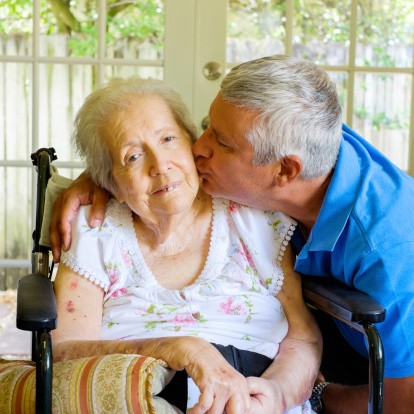Stricter Law for Mature Drivers Goes into Effect in VA on New Years
As we age, specific abilities needed to drive safely — such as vision, memory, physical strength, reaction time, and flexibility — may decline. Although some seniors are among the safest drivers on the road, those driving with declining faculties can make it dangerous for themselves and others. To address the issue, Virginia will join 33 states and the District of Columbia in enacting tougher standards for mature drivers, beginning on January 1, 2015.
In 2014, the Virginia General Assembly passed Darren’s Law (HB 771), named for 32-year-old Darren Morrell, an Oakton man who was killed in 2011 by an elderly driver who turned into the path of his motorcycle. Beginning on New Year’s Day, mature drivers in Virginia will be required to:
- renew their licenses in person at 75 years old, rather than 80 (in other words, those over 75 will no longer be able to renew electronically or by mail.)
- renew their licenses every five years (previously, drivers age 80 and older were required to renew in person every eight years).
- pass the Virginia Department of Motor Vehicles’ vision requirements or present a vision statement no older than 90 days from an optometrist or ophthalmologist.
The new law also gives judges more latitude to require older drivers found guilty in District Court of a traffic misdemeanor, traffic infractions, or other traffic violations to successfully complete traffic school, enroll in a “mature driver motor vehicle crash prevent course” or a “driving improvement course,” in lieu of a finding of guilty. The law allows all insurers writing motor vehicle insurance in Virginia to offer reductions in insurance premiums upon successfully completing an approved crash prevention course through actual classroom instruction.
Are mature drivers receptive to the tougher driving laws? Yes. Research by the AAA Foundation finds that senior drivers favor tougher driving laws and an overwhelming majority support greater scrutiny in the license-renewal process for themselves and their peers. Remarkably, support for these measures was greatest among drivers 75 and older, with seven out of 10 drivers favoring policies that require mature drivers to renew their license in person and also support requirements that seniors pass a medical screening to remain licensed.
“In many cases, seniors are some of the safest drivers out there. However, we know that aging naturally brings about health changes that can affect driving,” said DMV Commissioner Richard D. Holcomb, the Governor’s Highway Safety Representative. “Darren’s death is a tragic reminder of what can happen when unsafe drivers are out on the road. We think Darren’s Law is a good compromise that better protects Virginians while allowing seniors who are still able to safely drive to do so.”
Do you have a loved one who is a mature driver? Below are some helpful links for resources that can help you and your loved one (from Helpguide.org):
Risk factors of aging that can affect driving
Red Flags for Medically Impaired Driving – Lists the chronic medical conditions, acute events, and medications that can impact driving. (National Highway Traffic Safety Organization)
Understanding Dementia and Driving – Discusses the ability of people in early stages of dementia to drive; includes warning signs and a family agreement form for the senior to sign. (TheHartford.com)
Injury Prevention for Older Road Users – Find guides for driving when you have (or have had) arthritis, cataracts, diabetes, glaucoma, macular degeneration, Parkinson’s disease, seizures, or stroke. (National Highway Traffic Safety Organization)
Older driver safety tips and workbooks
Senior Driving – Interactive driving evaluations and other tools for senior drivers, as well as information on licensing laws in different states of the U.S. (AAA)
Drivers 65+ – A driving self-awareness quiz. Helps the senior to pinpoint areas of driving weakness, then to remediate them. Answer the quiz and get a customized set of tips for driving safely. (AAA Foundation for Traffic Safety)
You and Your Car: A Guide to Driving Wellness (PDF) – Includes myths about aging and driving, steps to being a safer driver, and driving skills assessment tools. (The Hartford Center for Mature Market Excellence)
Driving Safely While Aging Gracefully – Assess your driving skills and learn how age and physical symptoms affect your driving. (National Highway Traffic Safety Administration)
Driving Decisions Workbook (PDF – need to rotate it or print it) – A practical workbook for evaluating one’s own driving capabilities, with extensive suggestions for working around driving weaknesses. (University of Michigan Transportation Research Institute)
Talking to seniors about driving
We Need to Talk…Family Conversations with Older Drivers (PDF) – A guide to talking to a senior about their driving and planning for the senior to stop driving. (The Hartford Center for Mature Market Excellence)
At the Crossroads: Family Conversations about Alzheimer’s Disease, Dementia, and Driving (PDF) – (The Hartford Center for Mature Market Excellence)
Evaluating if it’s safe for seniors to drive
Older Driver Safety and Transition for the Mature Driver – (PDF) Written directly to older drivers, practical tips on utilizing resources to drive safely as long as possible (N4a.org)
Physician’s Guide to Assessing and Counseling Older Drivers – In-depth guide from the American Medical Association on how to evaluate the driving ability of older patients and intervene when necessary. (National Highway Traffic Safety Organization)
Your Road Ahead: A Guide to Comprehensive Driving Evaluations – Learn about comprehensive driving evaluations, including what they can tell you about the need for rehabilitation, retraining, or to stop driving. (TheHartford.com)
Getting a professional evaluation of a senior’s driving
Older driver safety refresher courses
AARP Driver Safety – A classroom course designed for older drivers to help them hone their skills and avoid accidents and traffic violations. Website features information on the classes and on senior driving in general, including FAQs, a driving IQ test, and a close call test. (AARP)
AARP Driver Safety Online Course – A driver safety refresher course for the over-50 age group. The same material as the classroom course, but online. You can take the online version in the comfort of your own home. (AARP)
Adjusting to life without driving
Tips for Helping Elderly Parents Adjust to Life without Driving – Social and online alternatives for driving. (Carefect)
Transportation alternatives for older drivers
Transportation Options for Older Adults – (PDF) Reviews different types of options and tips on choosing the best type for you. (Eldercare Locator)
Transportation – by Eldercare Locator offers a searchable database for transportation alternatives. Calling the help line at 800-677-1116 can also connect you with area agencies on aging and other aging services. (Eldercare Locator)
State-by-State Guide to Transportation Assistance (PDF) – A thorough guide to finding links to senior transportation in your area. (AARP)
Supplemental Transportation Programs Listing by State – Transportation programs for seniors throughout the U.S. (SeniorDrivers.org, AAA Foundation for Traffic Safety, and the Beverly Foundation)
Transportation Solutions for Caregivers: A Starting Point (PDF) – Guide for family caregivers offers tips on dealing with common transportation challenges and a list of helpful resources. (Easter Seals Disability Services)
What happens when you are the person who should no longer be driving and the time has come for you to hand over your keys? Which loved one would you want to broach this important subject with you? Now, as part of your incapacity planning documents, you can indicate who you would trust to help you if you could no longer drive safely. Our firm can help you draw up an Advance Driving Directive to name the person that you want to initiate the discussion with you about continued driving (or not) when the time is right. Or you can use this one provided by the American Automobile Association. Please read our blog post about this subject for more details.
Planning in advance for cessation of driving or other alternatives can help keep you and others safe on the road, so be sure to incorporate an Advance Driving Directive as part of your planning. If you have not done Long-Term Care Planning, Estate Planning or Incapacity Planning (or had your Planning documents reviewed in the past several years), or if you have a loved one who is nearing the need for long-term care or already receiving long-term care, call the Farr Law Firm at 703-691-1888 in Fairfax, 540-479-1435 in Fredericksburg, 202-587-2797 in Washington, DC or 301-519-8041 in Maryland, to make an appointment for a no-cost consultation.
A New Act to Help Special Needs Families
Q. My 9-year-old daughter, Noelle, is intellectually disabled. The costs for her therapy and assistive technology are quite high, and we are in the process of applying for government assistance (SSI).
Despite our struggles to make ends meet, her grandparents and my husband and I would like to save as much as we can to make sure she has everything she needs to be the best she can be. I heard about a new act, called the ABLE Act, that was approved by Congress this week. Can you tell me how it will work if signed into law by the President, and whether it will impact our eligibility for government assistance? Also, what can I do to ensure my daughter is taken care of, should something happen to me or my husband in the future? Thank you for your help and happy holidays!
A. The Achieving a Better Life Experience, or ABLE Act, which was approved by the Senate the evening of December 16 (having already passed in the House), is expected to be signed into law by President Obama. Once signed by the President, the ABLE Act will allow people with disabilities to create special accounts where they could save up to $100,000 without risking eligibility for benefits such as SSI and Medicaid. It is anticipated families could begin opening ABLE accounts in early 2015 after the IRS establishes rules and regulations.
The way an ABLE Act account would work is somewhat analogous to a 529 account for college students. ABLE accounts can only be used for expenses connected with a disabling condition.
Below are some preliminary guidelines:
- Establishing the account: An ABLE account can be established by a disabled individual or by others with the qualifying individual named as the account beneficiary.
- Earnings would grow tax free. When ABLE Accounts are created, qualifying individuals and their families will be able to deposit up to $14,000 annually. As in the 529 model, funds can be invested with tax-free growth potential.
- Withdrawals can be made that are tax-free on the federal level. Expenses can be paid from the ABLE account for the benefit of the disabled individual for education; housing; transportation; employment training and support; assistive technology and personal support services; health, prevention, and wellness; financial management and administrative services; legal fees; expenses for oversight and monitoring; funeral and burial expenses; and any other expenses approved under regulations.
- Age requirement: The disabled person establishing the account or for whom it is set up must have become disabled before reaching age 26. Therefore, an ABLE account could help younger people with developmental disabilities, mental illness, and conditions such as cerebral palsy.
- Supplemental Security Income (SSI): If the assets in an ABLE account reach $100,000 and the beneficiary is receiving SSI benefits, monthly SSI benefits will be placed in suspension. If the assets in the ABLE account drop back below $100,000, the SSI cash benefits resume. No re-application is necessary.
- Medicaid Eligibility: A beneficiary will not lose eligibility for Medicaid based on the assets held in the ABLE account, even during the time that SSI benefits are suspended (as described above for an account with over $100,000).
- Medicaid Payback Provision: Under the ABLE Act, when the qualified beneficiary dies (or if he/she is no longer disabled), any remaining assets in the ABLE Account are used to “pay back” any state Medicaid plan up to the value of Medicaid services provided to the beneficiary. The payback is calculated based on amounts paid by Medicaid after the creation of the ABLE Account. This is a MAJOR drawback for most families who want to fund a trust without giving up the right to allow other family members to ultimately benefit from any remaining assets. The National Academy of Elder Law Attorneys is fighting to ensure that the best parts of the ABLE legislation are preserved while proposing amending the Medicaid payback requirement.
For more details on the ABLE Act, please read this article on the Autism Speaks Website.
Special Needs Planning
It is vitally important for parents to take the right steps to ensure their child will be financially secure and cared for in the event of death or disability of the parent, including:
• Hiring an attorney who is experienced in creating special needs trusts, such as myself; • Clearly spelling out your wishes for the disbursement of trust funds within the trust document; • Finding someone you can trust that has your child’s best interests at heart to serve as trustee and/or • Hiring an institutional trustee that has a reputation for utilizing social workers and case managers to monitor the welfare of beneficiaries and determine how trust funds should be spent.
Special Needs Trust
Unlike an ABLE Account, assets remaining in a properly established Third Party Special Needs Trust are not recoverable by Medicaid at the time of the beneficiary’s death if the trust was funded using the assets of the parent or other third party. This allows the creator to provide for a secondary beneficiary. Therefore, an ABLE account should NOT be used as a substitute for a Third Party Special Needs Trust, but rather only a limited substitute for a First Party Special Needs Trust.
A special needs trust is recommended to protect a disabled individual’s financial future. Also known as Supplemental Needs Trusts, this type of trust preserves legal eligibility for federal and state benefits by keeping assets out of the disabled person’s name while still allowing those assets to be used to benefit the person with special needs. Read more here.
When it comes to special needs planning, the Fairfax and Fredericksburg Law Firm of Evan H. Farr, P.C. can guide you through this process. If you have a loved one with special needs, call 703-691-1888 in Fairfax or 540-479-1435 in Fredericksburg to make an appointment for a no-cost consultation.
Happy holidays to you and your family!
Critter Corner: Holiday Tips for Parents of a Special Needs Child
Dear Saki and Alley,
I recently got remarried and we are going to my sister’s house for the holidays. My new stepson, Sean, is autistic and doesn’t do well with new places or changes to his routine. Do you have any suggestions for how I can help my new husband make the holidays a happy time for him, his son, and for everyone else?
Mary Day-Forall
—–
Dear Mary,
It can be challenging to keep some children with special needs happy during the holidays, especially those who become overwhelmed easily and others who might find the break in routine unsettling. Luckily, there are plenty of strategies that can help children with special needs have just as much fun as any child:
- Prepare them ahead of time: A visual schedule is a good way to help someone with autism understand why and how his routine will change, allowing him to focus on the fun to come and lowering his anxiety over being in a different place with different people. Apps like ChoiceWorks and Routinely can be helpful in creating visual schedules.
- Share a gift list with relatives ahead of time: Provide family members with ideas for suggested gifts, including something the child has seen before and loves or something similar, a book because kids should practice their reading, a sensory gift like Play Doh or indoor molding sand, or a gift that addresses one of the goals he’s working on at school or in therapy.
- Bring a helper: If you have a sitter you trust, bring him or her along if it okay with the host. He or she could play with the child and make sure he doesn’t wander into the street (if your stepson tends to wander).
- Let go of expectations: Don’t expect things to be a disaster, or the opposite. Help prepare your stepson ahead of time and do the best you can (within your control) to make the holiday a success. Don’t stress yourself out too much if your stepson doesn’t participate in certain family traditions. For example, if your stepson doesn’t want to eat with everybody else, it’s okay, or if he needs to take a break, let him go.
For more tips, please see the AbilityPath Holiday Survival Guide for Families with Special Needs Children.
Don’t forget to plan for your stepson with a Special Needs Trust, and make any updates to your estate planning, since you were recently remarried. We wish you and your family a very happy holiday!
Finding the Right Nursing Home
Carol and Bob invited his mother, Ginny, to spend the holidays with them, as she does every year. This year, her live-in caregiver expressed concern that it was not a good idea because Ginny’s dementia has gotten worse and she may not recognize her own grandchildren. Ginny cannot do much independently anymore and needs help with most activities of daily living, including preparing meals, bathing, and using the bathroom. The conversation with the caregiver was the confirmation Bob needed that the time had come to look for a nursing home for his mother.
Bob didn’t have the most favorable impression of nursing homes, until he visited his Uncle who thrived in one that was immaculately clean, had a homelike atmosphere, and boasted rooms that were cheerfully decorated with resident’s personal possessions. He thought this particular nursing home would be perfect for his mother, if it wasn’t so far away. With so many nursing homes in the DC Metro area to choose from, how will he find the right one? And more important, how can his mother afford it?
When seniors and their families plan ahead, they can make multiple visits to facilities to find the one that best meets their needs. But if, like Bob, you have no choice and need a nursing home for a loved one right away, there are tools you can use to begin your search. The federal government’s online tool, Nursing Home Compare, can be a good starting point for consumers. The site offers star ratings for all nursing homes that participate in Medicare (for short-term rehabilitation) or Medicaid (for long-term care). The ratings are based on the facility’s performance on health inspections, staffing hours for nurses and nursing assistants, and quality measures, such as the prevalence of pressure ulcers and falls among residents.
Another site, Nursing Home Inspect, is a consumer-oriented tool that can help you compare nursing homes’ inspection results and run-ins with regulators. ProPublica, an investigative news organization, launched this online tool to enable consumers to compare nursing homes in their state based on problems found by regulators and the financial penalties imposed. It is also wise to call your state department on aging and your local long-term-care ombudsman’s office to ask about any state sanctions and consumer complaints against facilities you’re considering. You can find links to your state programs at the Eldercare Locator.
When it comes to quality of care, in my experience with clients and in writing the Nursing Home Survival Guide, I have found that while online rating sites are worthwhile, they do not tell the whole story. There are also some important things you should do (and look out for) before selecting a nursing home for a loved one:
- Take a tour during regular business hours.
- Have a meal.
- Schedule another visit late in the evening or on a Sunday afternoon, to get a sense of round-the-clock life in the facility.
- Pay attention to smells, sounds, and temperature.
- Observe whether residents are engaging in activities or sitting around listlessly. Also, ask the administrator about activities for residents.
- Check the bulletin boards for information on resident and family council meetings. Leaders of these groups, which advocate for residents in the home, can provide insight on any concerns about the facility.
- Observe whether residents are sitting around waiting to be fed at mealtimes or waiting to go to bed after dinner. If so, the facility probably doesn’t have enough staff.
- Ask about the level of staff turnover, which tends to be fairly high in nursing homes. If they’ve had four administrators in one year, it may be a red flag.
- Ask the facility if it practices “consistent assignment,” meaning that the same aide is assigned to care for the resident each day. In facilities that don’t use consistent assignment, residents can have as many as 20 or 25 different people caring for them in a month.
- Ask about the ratio of staff to residents. A good minimum ratio would be about one to five during the day, one to ten in the evening, and one to fifteen at night.
Before you or your mother sign the admissions agreement, understand what you’re signing, and do not sign any paperwork unless everything has been fully reviewed by an experienced Elder Law attorney. Keep in mind that almost all admissions contracts are written to be lean in favor of the facility, and often at the disastrous financial expense of the nursing home resident’s family member who signs the contract as the “responsible party.” However, these provisions can always be eliminated from the nursing home contract by an experienced Elder Law attorney.
Bob, in our example, is concerned about affordability of nursing home care. This is a legitimate concern for many people in his situation, as nursing homes in Northern Virginia cost $10,000-12,000 a month. To protect your family’s hard earned money and assets from these catastrophic costs, the best time for your father to create his long-term care strategy is NOW. It is never too late to nursing home receiving long-term care, it would not be too late to do Long-term Care Planning, also called Lifecare Planning and Medicaid Asset Protection Planning. Please call us at 703-691-1888 in Fairfax, 540-479-1435 in Fredericksburg, or 202-587-2797 in Washington, DC to make an appointment for a no-cost consultation.
Critter Corner: Will Medicaid Pay for Assisted Living?
Dear Baxter,
My father is in the early stages of dementia, and is considering assisted living. If my father is eligible, does Medicaid cover assisted living, or only nursing home care?
Thanks for your help!
Anita Sistance
—
Dear Anita,
Assisted living has become an increasingly popular alternative to nursing care when our aging loved ones need attention and care outside the scope of our capabilities. For those who do not require around-the-clock care, there is a greater degree of autonomy in assisted living than in nursing homes. However, for those relying on Medicaid for long-term care assistance, assisted living is not always an option.
An assisted living facility (ALF) is different from a nursing home or skilled nursing facility because in assisted living, there are typically nurse aides rather than actual nurses, and ALFs are designed for people who need a lesser degree of assistance with activities of daily living. In all states, Medicaid covers nursing home care for someone who is financially eligible, but in some states, such as Virginia, Medicaid does not provide any coverage for assisted living.
At this time, forty-four states do offer some level of financial assistance to individuals in assisted living. Keep in mind that the term “assisted living” is not used consistently across each state, nor are their definitions or benefits the same. Terms used include: residential care, adult foster care, personal care homes, supported living and several other variations. Some states pay only for personal care services received in assisted living, while others include nursing services, and/or room and board costs.
The Centers for Medicare and Medicaid Services (CMS) sets certain guidelines on how each state must spend its Medicaid dollars, but each state is permitted considerable latitude within those guidelines. Most states that help with the cost of assisted living do so through their Medicaid waivers instead of with general Medicaid dollars.
In Virginia, there is one Medicaid waiver program that is theoretically available to individuals with Alzheimer’s disease or dementia who require the services of ALFs. However, there are an extremely limited number of positions available and a very long waiting list, making the waiver essentially illusory. Virginia also has a separate program, called the Auxiliary Grant (AG), which is not part of Medicaid but can help certain people with very low income pay for an AG bed in and ALF. Unfortunately, not all ALFs participate in the AG program, and those that do typically have very few AG beds, and they become available less frequently than nursing home beds. Although the AG program is administered by the local Medicaid agencies in each County and City, AG is not a type of Medicaid.
When is assisted living not enough for a loved one? According to Dr. Catherine Hawes, a professor of health policy and management at the Texas AM Health Science Center, “Anyone with moderate to severe cognitive impairment and problem behaviors like resisting care or becoming alarmed if someone tries to help them shower generally belongs in either a dementia unit with well-trained staff or in a nursing home. In standard assisted living, “there’s not enough staff to help.”
Assisted living is also not enough for seniors with complicated medical conditions that require regular monitoring. Assisted living doesn’t provide much health care, so residents risk going in and out of hospitals for conditions that could perhaps be treated in a nursing home.
Medication management (a program to provide the right dose at the right time) can take place in either type of facility, but in most states assisted living staff cannot legally administer medication, and may only hand it to a resident. Therefore, someone whose dementia means that moments later he or she won’t remember to swallow their pills, may easily fall off his or her drug regimen.
Assisted living can pose a problem for seniors with incontinence, too. Housekeeping staff in assisted living typically change linens weekly. This would not work well for someone who needs help getting changed several times a day and needs the sheets changed more frequently.
Further, federal regulation provides greater protection for nursing home residents. State regulations govern assisted living, and they vary widely. Assisted living facilities can evict people at any time and basically for any reason. Nursing homes can only discharge people for a small handful of reasons, and must always make a “safe discharge.”
Nevertheless, assisted living can work well for people with mild cognitive impairment who desire privacy (private apartments being more common) and who are sociable and alert.
Do you have a loved one who is suffering from dementia? Are you considering long-term care options, including assisted living or nursing home care? Persons with dementia and their families face special legal and financial needs. At the Virginia and DC Medicaid Planning Law Firm of Evan H. Farr, P.C., we are dedicated to easing the financial and emotional burden on those suffering from dementia and their loved ones. If you have a loved one who is suffering from dementia, we can help you prepare for your future financial and long-term care needs. We help protect the family’s hard-earned assets while maintaining your loved one’s comfort, dignity, and quality of life by ensuring eligibility for critical government benefits. Call 1-800-399-FARR to make an appointment for a no-cost consultation in any of our offices: Fairfax, Virginia; Fredericksburg, Virginia; or Washington, DC.
Arf Arf,
Baxter
Ask the Expert: Can You Explain Social Security, please?
Q. I am 62 and getting ready to retire. I am really confused about how Social Security works. Can I start collecting now, or do I need to wait until I am 65? Also, what is all this about credits? I thought Social Security was determined based on the number of hours worked in a lifetime? There is just so much information out there and I want to make sure that I understand what’s to come, before making any decisions. Can you explain Social Security eligibility and how credits work? Thank you for your help!
A. Social Security is the foundation of retirement in America, and it is important to become knowledgeable about how it works because what people don’t know about the system can hurt them financially.
For millions of Americans, Social Security benefits will be their only source of income after they retire. And, for many entering retirement, the knee-jerk reaction is to file for benefits at 62, as soon as they are eligible. However, that decision can cost hundreds of thousands of dollars through their retirement years.
We recently created a Social Security FAQ to help clarify why waiting to take Social Security benefits can be beneficial, and to clear up any areas of confusion when it comes to Social Security and earning credits for single people, spouses, divorcees, disabled people, widows, and widowers. Below are excerpts from our FAQ page that will hopefully help answer your questions:
Q. What are Social Security Credits?
A. Credits are the “building blocks” the Social Security Administration (SSA) uses to find out whether you have the minimum amount of covered work to qualify for each type of Social Security benefit. If you stop working before you have enough credits to qualify for benefits, your credits will stay on your record. If you return to work later on, you can add more credits so that you can qualify. No benefits can be paid if you do not have enough credits. Please see this video for more details.
Q. How are Social Security Credits Earned?
A. When you work and pay Social Security taxes, you earn up to a maximum of four “credits” for each year. The way you earn a credit has changed over the years.
- Before 1978, employers reported your earnings every 3 months and we called credits “quarters of coverage,” or QCs. Back then, you got a QC or credit if you earned at least $50 in a 3-month calendar quarter.
- In 1978, employers started reporting your earnings just once a year. Credits are now based on your total wages and self-employment income during the year, no matter when you did the actual work. You might work all year to earn four credits, or you might earn enough for all four in a much shorter length of time.
- The amount of earnings it takes to earn a credit has changed since 1978. In the year 2014, you must earn $1,200 in covered earnings to get one Social Security work credit and $4,800 to get the maximum four credits for the year. In the year 2015, you will need to earn $1,220 in covered earnings to get one Social Security work credit and $4,880 to get the maximum four credits for the year.
During your lifetime, you probably will earn more credits than the minimum number you need to be eligible for benefits. These extra credits do not increase your benefit amount. Your average earnings over your working years determine how much your monthly payment will be.
Q. When can I begin collecting Social Security benefits?
A. You may claim early benefits starting at age 62, but they will not be the full benefits you would receive by waiting for your full retirement age. The full retirement age (FRA) is 65-67, depending on when you were born. For those born before 1938, the age is 65 and for those born in 1938 or later, the FRA gradually increases by monthly increments. If you were born in 1960 or later, your FRA is 67. To determine your retirement age, visit the Social Security website here.
Q. How can I maximize my benefits when planning for Social Security and retirement?
A. Because your ultimate pay-out is based upon the top 35 years of your earning career, obviously you should try to earn as much as you can. Another way to possibly increase benefits is to wait until you reach your full retirement age before claiming them (I say “possibly increase” because by waiting, you of course take the small risk of dying before you claim your benefits). Another way to possibly increase benefits is to wait even longer to retire – continuing to work after you reach FRA allows you Social Security monthly check to build up, because Social Security retirement benefits are increased (the percentage increase depends on your birth date) if you delay your retirement beyond your FRA (note that this benefit increase does not apply once you turn 70. This won’t be an option for everyone, but if you are able to delay retirement (and don’t die), you can reap the reward of larger monthly checks. However, just because you wait does not necessarily mean that you’ll receive more in retirement benefits over your lifetime; if you live to an average life expectancy for
someone your age, you will receive about the same amount in lifetime benefits no matter whether you choose to start receiving benefits at age 62 or any other age.
For lots of additional details about Social Security, including spousal benefits, please visit our Social Security FAQ page.
In 2015, Social Security recipients will see their benefits rise 1.7%, thanks to annual cost-of-living (COLA) adjustments. Beginning in January 2015, for the average retiree, monthly benefits will rise $20 to $1,310. For more details, please see the Key Elder Law Dollar Amounts on our Website.
What if you are living on social security alone and you or a loved one becomes incapacitated? You must take this into account when planning for retirement. Every adult over the age of 18 should have an Incapacity Plan that includes a Financial Power of Attorney, an Advance Medical Directive, and an Advance Care Plan. Just as important is that you get special medical certifications in place in connection with your Power of Attorney so that your Agent under your POA will be able to obtain a Reverse Mortgage for you if you don’t have one in place while you’re still mentally competent. At the Law Firm of Evan H. Farr, P.C., we provide these special medical certification forms for all of our elderly clients as part of our Level 1 Incapacity Planning. If you don’t have an Incapacity Plan in place, now is the time to get started. Call us today at 703-691-1888 in Fairfax, 540-479-1435 in Fredericksburg, or 202-587-2797 in Washington, DC to set up an appointment for a no-cost consultation.
Reducing Holiday Stress for Seniors & Caregivers
Mary Ellen’s father, Hal, suffers from dementia and his health is declining rapidly. Her husband travels often and her mother recently had knee replacement surgery and has trouble getting around. Every night after work, she drops her children off at dance, tae kwon do, or soccer, and goes over to her parents’ house to help out. Today, she realized that it is December 9 already, and she hadn’t even gotten to her Christmas list or put up her tree. When her son asked why they hadn’t baked gingerbread cookies together yet, she felt about ready to snap. Instead of enjoying the holiday season with her family, Mary Ellen wishes it were over.
For people like Mary Ellen who juggle work, family and caring for a loved one, the holidays can create a lot of extra stress. They can also be a source of stress for seniors due to travel plans, an uprooted schedule, and even seasonal depression. Instead of letting stress or the seasonal blues ruin a time meant to be enjoyed with family and friends, there are ways for seniors and their caregivers to step back and enjoy this time of year.
Below are tips for caregivers, loved ones, and seniors on lessening the stress this holiday season:
Alter Traditions a Little
Between cleaning the house and cooking for a crowd, hosting a holiday meal can be a source of stress. If an older relative traditionally hosts Christmas dinner, consider passing the tradition on to the younger generation of family members. If the relative insists on hosting, ask younger family members in advance to help or prepare part of the meal.
Skip the Mall
Stress and safety concerns can cause the hectic nature of holiday shopping to become a real headache. Instead of braving the crowds at the local mall, brew up some tea or hot chocolate and help your elderly loved one purchase holiday gifts online or from a catalog in the comfort and safety of their home. As you browse, take the time to reminisce about favorite gifts from the past.
Decrease Gifts
For many senior citizens, especially those on a fixed income, the holidays can be a financial challenge due to purchasing gifts for many family members. To reduce stress from paying for gifts, consider having a family grab bag, where everyone contributes one gift.
Rest after Traveling
For some senior citizens, the holidays are a time to travel long distances to visit family and friends. Whether they travel by car, plane, or rail, keep in mind that an older relative might want to rest upon arrival. Offer the options of relaxing on the sofa and watching television (such as a holiday movie on the Hallmark channel) or taking a nap instead of planning a day of shopping and visiting.
Make Homes Accessible
If older relatives are visiting for the holidays, ensure your home is safe and accessible. Be mindful of tripping hazards, such as area rugs. Consider having your relative sleep on the first floor of your home. If that’s not possible, let them stay in a room close to the bathroom. In addition, use nightlights in the hallway so they don’t fall in the dark. Read our blog post on making homes more accessible for seniors.
Create Time for Yourself
Don’t let the holiday season planning, shopping, and stress get the best of you. Find respite care for your loved one so that you can take time and de-stress. Once you’ve created some time for yourself, have lunch with friends, read a book you’ve been hoping to read, or spend time baking with your children. The greatest gift that you can give to yourself and your loved one is your calm and centered presence. Everything else can wait!
Find Senior-Friendly Events in the Community
If you’re looking for an activity that your aging parents can participate in without the entire family, the senior center in your area may coordinate caroling, cooking or gift-wrapping events that will get your loved one out of the house and engaged in the community. It will give you, the family caregiver, some time for you!
Support your Food Bank or Local Charity
Help your loved one go through their pantry, linens and clothing in search of items that may no longer be useful (or necessary). Donate to local shelters and charities and save the receipt for taxes. It always feels good to de-clutter while helping others in need!
Make a New Year’s Resolution
As a new year approaches, create resolutions that are far more meaningful than losing weight or getting organized. Resolve to spend quality time with your aging loved ones, to bring the grandchildren for more frequent visits, or to look into home care or nursing home care — to relieve some of the caregiving responsibilities from yourself, and ensure the well-being of your aging family member(s).
If you are a family caregiver, please read our blog post about caregiver burnout and how to minimize the stresses involved with caregiving during the holidays and all year round.
At the Fairfax and Fredericksburg Elder Law Firm of Evan H. Farr, P.C., we recognize that caring for a loved one strains even the most resilient people. If you’re a caregiver, take steps to preserve your own health and well-being. Part of taking care of yourself is planning for your future and for your loved ones. Please call us at 703-691-1888, in Fairfax, at 540-479-1435 in Fredericksburg, or at 202-587-2797 in Washington, DC to make an appointment for a no-cost consultation.
Critter Corner: Tech Gifts for Grandma
Dear Commander Bun Bun,
The holidays are upon us. Since you are the pet who is known to be the most tech savvy at the firm, do you have any ideas for devices that I can buy for my technologically-challenged (but learning) grandmother, Alice?
Thanks for your help,
Holly Day-Schopper
—-
Dear Holly,
There are some new devices on the market today that are designed specifically for seniors, from the tech-savvy to the technologically-challenged. These devices have features, such as bigger screens, larger icons, and better customer support packages to make them more appealing and easier to use for seniors.
Smartphone:
If you’re considering a smartphone for your grandmother, check out the new GreatCall Touch3 by Samsung. It has a 4-inch touchscreen with a large icon menu list that offers access to the phone, text messaging, camera, pictures, email and Internet, along with contacts and apps. It offers a variety of health and safety features such as: the 5Star app that lets you speak with a certified agent who can identify your location and get you the help you need; Urgent Care, an app to access registered nurses and doctors for advice and diagnoses; and MedCoach, which offers medication reminders.
Tablet:
If you’re considering a tablet, AARP’s new RealPad is an Android tablet specifically designed for seniors that features a big screen and offers large text icons to access email, social networks, weather, news, games, camera and pictures, Google, the Web, apps and more.
Computer:
If you think your grandmother would like a desktop computer, the Telikin is a touch-screen computer that displays a big button menu on the screen at all times, providing simple access to most functions, such as the Internet, email, games, and more. The Telikin even offers a “tech buddy” feature so you can access your grandma’s computer remotely from your computer to help her when she needs it.
For more great technology gift ideas, please read our recent blog posts, NASA SmartWatch, Implanted Health Devices, and Other New Technology for Seniors, New Technology to Age in Place, New Technology Prevents You From Losing Your Children, and New Technology Prevents Older Loved Ones from Falls.
The staff and pets here at the Farr Law Firm are pleased to see all of the advances in technology available to help improve quality of life, health, and well-being for seniors. We hope your grandmother will enjoy whatever you decide to get her, and we hope you are able to spend quality time with her and your family this holiday season!
As a Certified Elder Law Attorney, Mr. Farr focuses on helping protect seniors and their families by preserving dignity, quality of life, and financial security. Call us anytime at 703-691-1888 in Fairfax, 540-479-1435 in Fredericksburg, or 202-587-2797 in Washington, D.C. to make an appointment for a no-cost consultation.
Hoppy Holidays!
Commander Bun Bun








